When embarking on the journey of raising a poodle puppy, it's vital to understand their unique dietary needs to ensure they grow into healthy adult dogs. From the first moments of puppyhood, their nutrition plays a pivotal role in shaping their future well-being. But what exactly should you be feeding your poodle puppy to set them on the right path to a healthy and vibrant life? Let's explore the key nutritional requirements that poodle puppies require for optimal growth and development, guiding you on the path to providing the best care for your furry companion.
Key Takeaways
- High-quality proteins and essential fats are crucial for muscle, brain, and overall development.
- Choose puppy food with real meat, essential fats, vitamins, and minerals for strong bones and brain development.
- Gradually transition to adult diet with proper portion control and vet guidance for optimal growth.
- Supplement with necessary nutrients and ensure proper hydration for healthy development and well-being.
Poodle Puppies' Nutritional Needs Overview
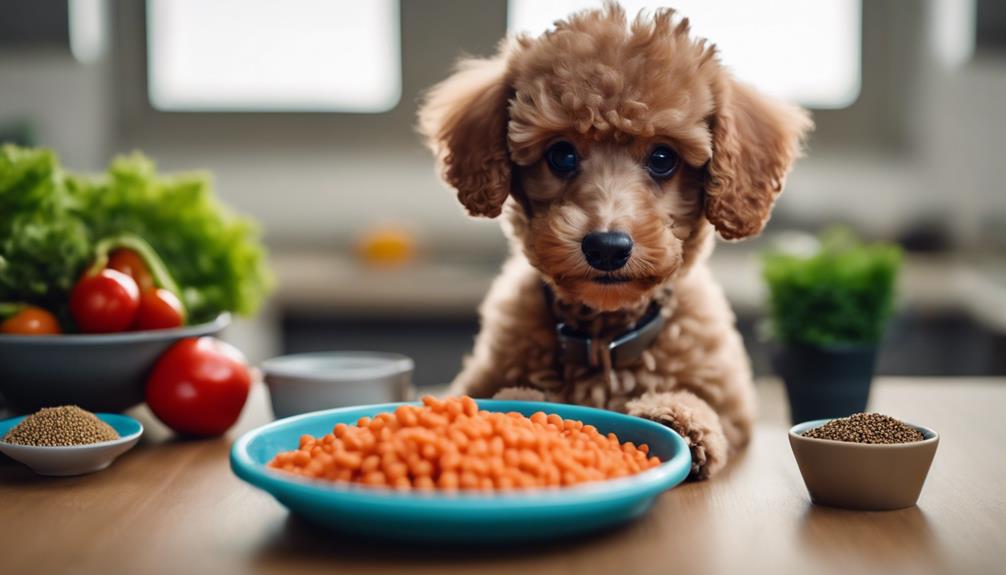
When considering the nutritional needs of Poodle puppies, high-quality proteins, essential fats, vitamins, minerals, calcium, phosphorus, and DHA are crucial for their healthy growth and development. Poodle puppies have specific dietary requirements to support their rapid growth and overall health. High-quality proteins are essential for muscle development and tissue repair. Essential fats provide energy and are particularly important for brain development in Poodle puppies. Vitamins and minerals play a vital role in supporting their immune system and overall well-being.
Calcium and phosphorus are key nutrients necessary for bone development in growing Poodle puppies. These minerals help in forming strong bones and teeth, ensuring proper skeletal growth. Additionally, DHA, an omega-3 fatty acid, is crucial for brain development and vision in Poodle puppies. Including DHA in their diet supports cognitive function and overall neurological health. Ensuring a well-rounded diet rich in these essential nutrients is vital for the healthy growth and development of Poodle puppies.
Importance of Protein for Poodle Puppies
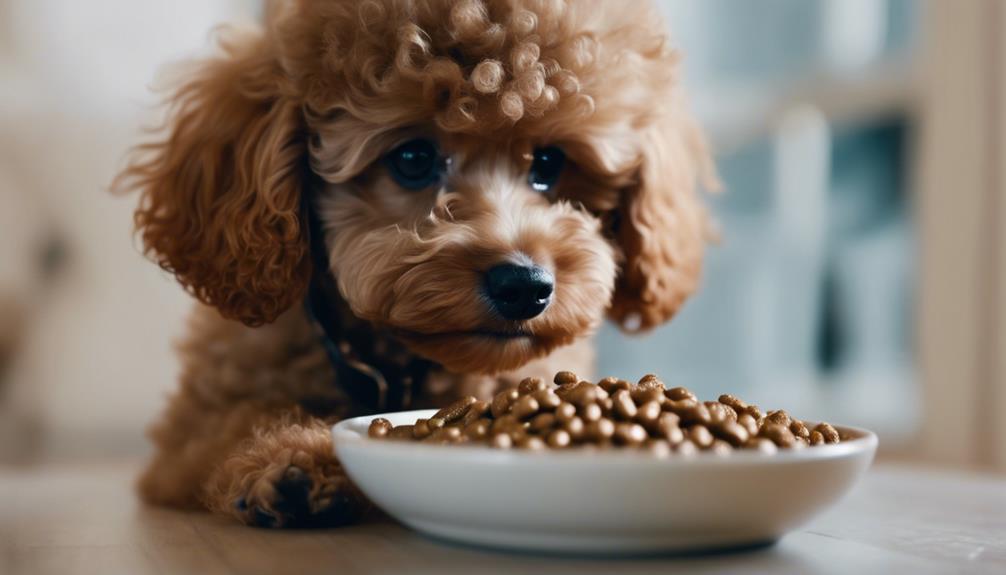
Protein serves as a foundational element in the diet of Poodle puppies, essential for fostering robust muscle growth and overall health. Ensuring your Poodle puppy receives adequate protein is crucial for their development and well-being. Here's why protein is so important for your furry friend:
- Muscle Growth: Protein provides the necessary building blocks for developing strong muscles in your Poodle puppy, supporting their agility and physical strength.
- Organ Function: Adequate protein intake is vital for proper organ function, ensuring that your Poodle puppy's body systems work efficiently and effectively.
- Energy Levels and Active Lifestyle: Protein-rich diets help maintain your Poodle puppy's energy levels, enabling them to keep up with their playful and active lifestyle.
Essential Fats for Poodle Puppies

Incorporating essential fats into a Poodle puppy's diet is paramount for supporting their brain development and overall health. Omega-3 and Omega-6 fatty acids play a crucial role in the healthy growth of Poodle puppies. Omega-3 fatty acids are particularly beneficial for brain development, vision, and cognitive function during this critical stage of their life. Additionally, these essential fats contribute to a shiny coat and healthy skin, enhancing their overall well-being. By ensuring proper levels of essential fats in their diet, you facilitate the absorption of fat-soluble vitamins that are essential for their health. Including sources of Omega-3 and Omega-6 fatty acids in your Poodle puppy's meals will not only promote optimal development but also support their overall health and vitality. Prioritizing these essential fats in their diet will set a strong foundation for your Poodle puppy's growth and well-being.
Choosing High-Quality Puppy Food
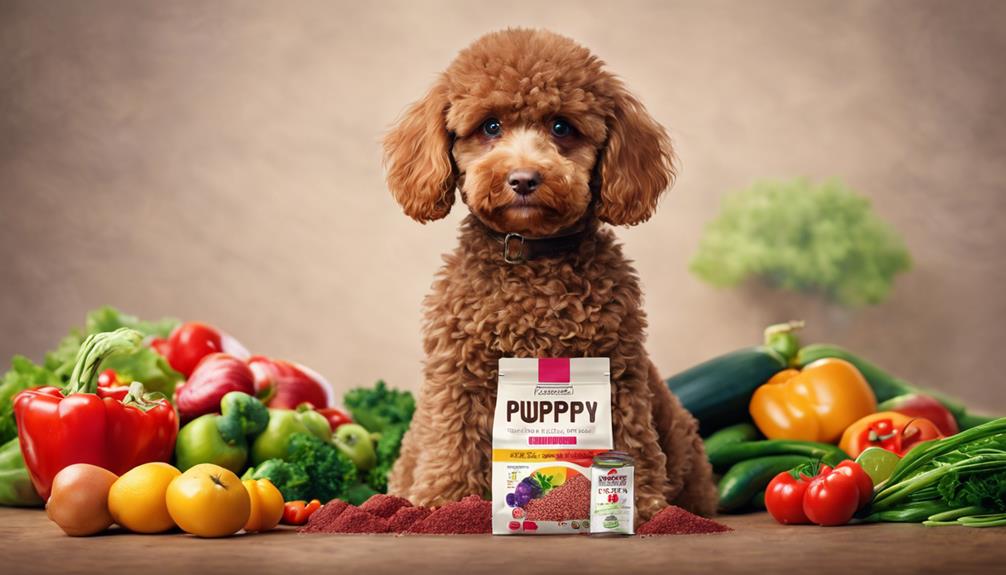
To ensure optimal growth and health for your Poodle puppy, selecting high-quality puppy food tailored to their specific nutritional requirements is essential. When choosing the best food for your furry friend, keep these key points in mind:
- Real Meat: Look for puppy food that lists real meat as the primary ingredient. Poodle puppies require high-quality protein sources to support healthy muscle development.
- Essential Fats: Ensure the puppy food contains essential fats such as Omega-3 and Omega-6. These fats are vital for providing energy and maintaining a shiny coat, keeping your Poodle puppy healthy and active.
- Vitamins, Minerals, Calcium, Phosphorus, and DHA: Check for essential vitamins and minerals in the puppy food to support overall growth and development. Additionally, consider the levels of calcium and phosphorus for strong bone growth and the presence of DHA for brain and vision development in Poodle puppies. Meeting these unique nutritional needs will help your puppy thrive and reach their full potential.
Transitioning Puppies to Adult Diet
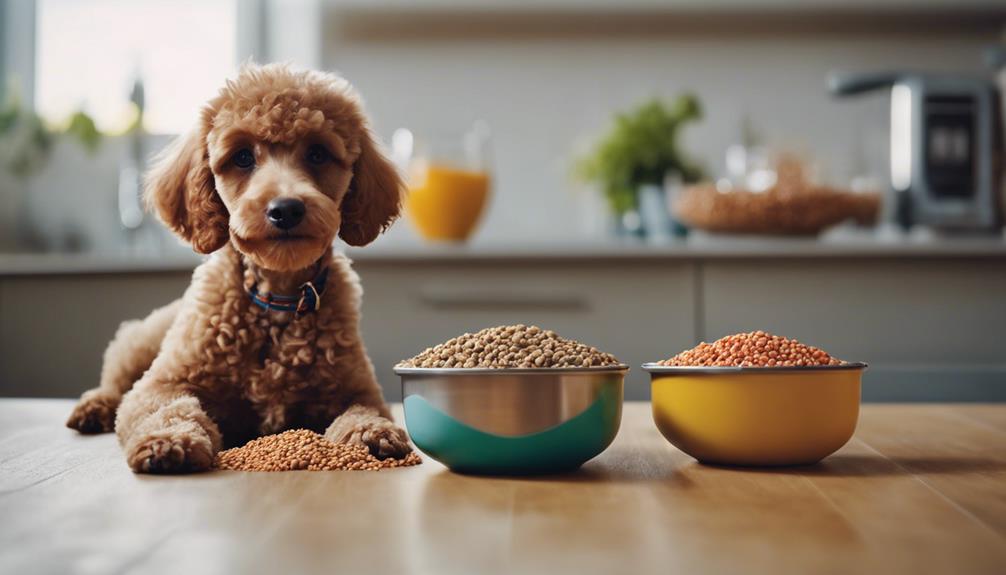
When transitioning your Poodle puppy to an adult diet, remember to make the change gradually over a span of 7-10 days to prevent digestive issues. Start by mixing a small portion of adult food with their current puppy food, slowly adjusting the ratio. Monitor their stool consistency and overall well-being throughout the transition to ensure a smooth adjustment to the new diet.
Age-Appropriate Diet Transition
Gradually transitioning your Poodle puppy to an adult diet over a 7-10 day period is crucial to prevent digestive upset. To ensure a smooth transition, follow these steps:
- Start by mixing a small amount of the new adult food with the puppy food, gradually increasing the ratio over the transition period.
- Monitor your puppy's response closely for any signs of digestive issues or discomfort.
- Confirm that the adult food meets the nutritional needs of your growing puppy, providing essential proteins, fats, vitamins, and minerals for optimal development.
Nutrient Balance Consideration
Maintain a balanced nutrient intake when transitioning Poodle puppies to an adult diet by carefully considering the protein, fat, carbohydrate, vitamin, and mineral content of the food. It is crucial to monitor the growth, energy levels, and overall health of the puppies during this transition period to ensure they receive the necessary nutrients for proper development. Consulting with a veterinarian can provide specific guidance on adjusting the diet to meet the changing needs of growing Poodle puppies. Here is a table to highlight the importance of nutrient balance consideration during this transition:
| Nutrient | Role | Food Sources |
|---|---|---|
| Protein | Essential for muscle development | Chicken, Fish, Eggs |
| Fat | Provides energy and supports growth | Salmon, Flaxseed, Sunflower |
| Carbohydrate | Energy source for daily activities | Brown Rice, Sweet Potato |
Slow and Gradual Change
Consider the importance of gradually adjusting your Poodle puppy's diet to prevent digestive issues and ensure a smooth transition to an adult diet. When transitioning puppies, follow these steps for a successful changeover:
- Transition Slowly: Over 7-10 days, gradually mix the new adult diet with the current puppy food.
- Monitor Response: Watch for any signs of digestive upset like diarrhea or vomiting during the transition period.
- Consult Vet: If you notice any issues or if your puppy is not tolerating the change well, seek guidance from a veterinarian promptly.
Abrupt changes can lead to stomach upset and other health problems, so it's crucial to monitor your puppy closely and seek professional advice when needed.
Portion Control for Growing Poodles
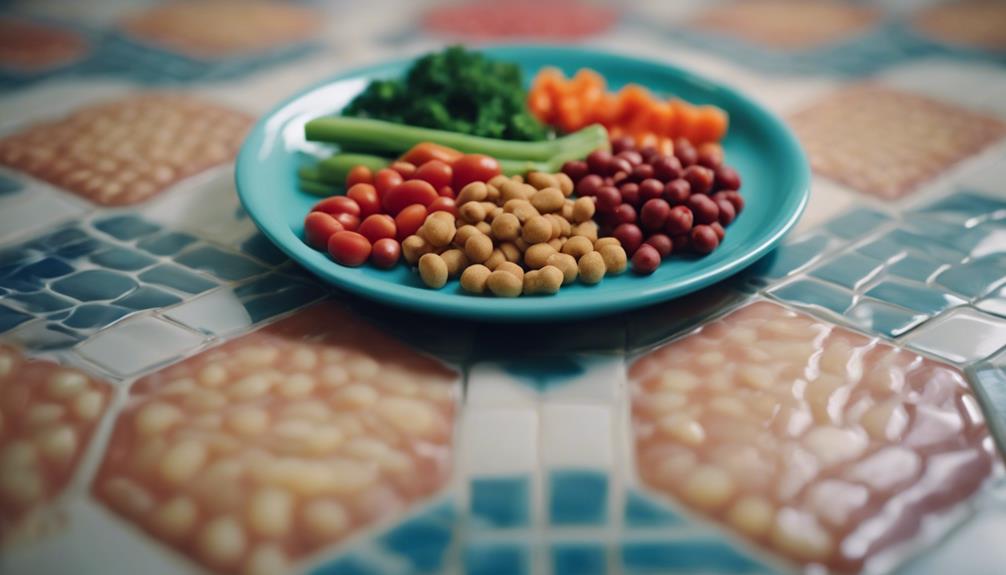
For optimal growth and health of your growing Poodle puppy, precise portion control tailored to their age, size, and activity level is essential. Proper portion control plays a significant role in weight management and overall nutrition for your Poodle puppy. Overfeeding can lead to obesity and related health issues, so providing measured portions is crucial. Adjusting portion sizes based on your puppy's age, size, and activity level supports healthy growth and development.
Consulting with a veterinarian is recommended to determine the appropriate portion sizes for your Poodle puppy. Veterinarians can offer expert guidance on portion control tailored to your puppy's specific needs. Monitoring your puppy's food intake and making necessary adjustments to portion sizes ensures they receive the right amount of nutrients for their growth and well-being.
Supplements for Poodle Puppies
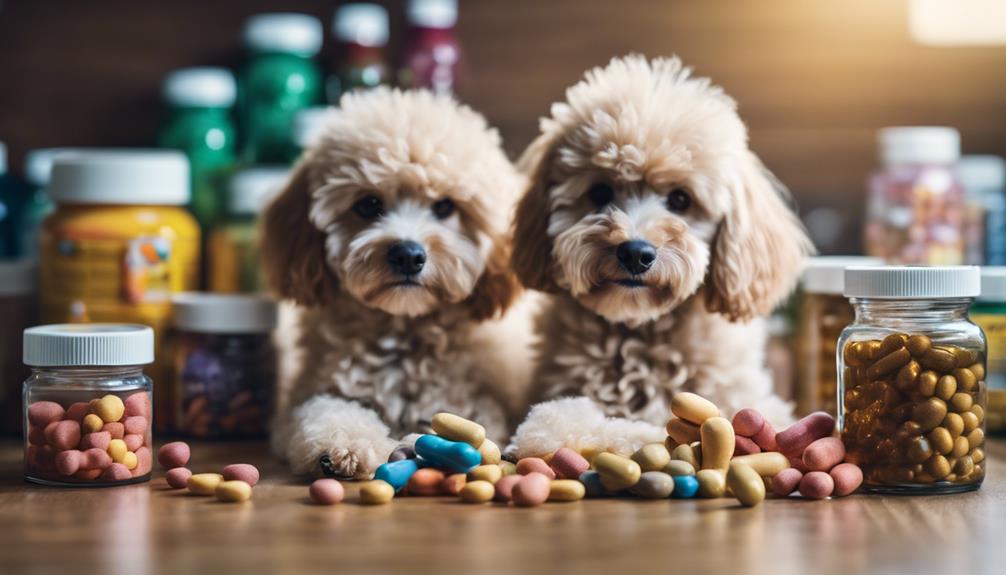
You should consider essential puppy supplements to support your Poodle puppy's growth and development. Proper guidance on dosage is crucial to ensure these supplements are beneficial and not harmful. Consult with your veterinarian to determine the specific supplements that will address your Poodle puppy's individual health needs.
Essential Puppy Supplements
When selecting essential supplements for your Poodle puppy, consider incorporating multivitamins to support their growth and development. Along with multivitamins, here are three crucial supplements to keep in mind:
- Joint Supplements: Aid in maintaining optimal joint health as your Poodle puppy grows.
- Probiotics: Essential for digestive health, promoting a healthy gut flora balance.
- Omega-3 Fatty Acids****: Support brain development and contribute to a shiny coat in Poodle puppies.
These supplements play a vital role in ensuring your Poodle puppy's overall well-being, from strong bone development to healthy digestion and brain function. By including these in their diet, you can help set them up for a healthy and vibrant future.
Proper Dosage Guidance
To ensure the proper growth and development of your Poodle puppy, it is crucial to adhere to precise dosage guidelines when administering supplements. Poodle puppies can benefit from supplements like multivitamins specially formulated for their growth requirements. Seek guidance from a veterinarian to determine the recommended dosage for these supplements. It is important to avoid over-supplementing, as this can pose health risks and lead to imbalances in young Poodles. Follow the dosage instructions provided by the supplement manufacturer diligently. Monitor your puppy's response to the supplements closely and be prepared to make adjustments based on their health and development needs. By carefully managing the dosage of supplements for your Poodle puppy, you can support their overall well-being effectively.
Hydration and Poodle Puppy Health
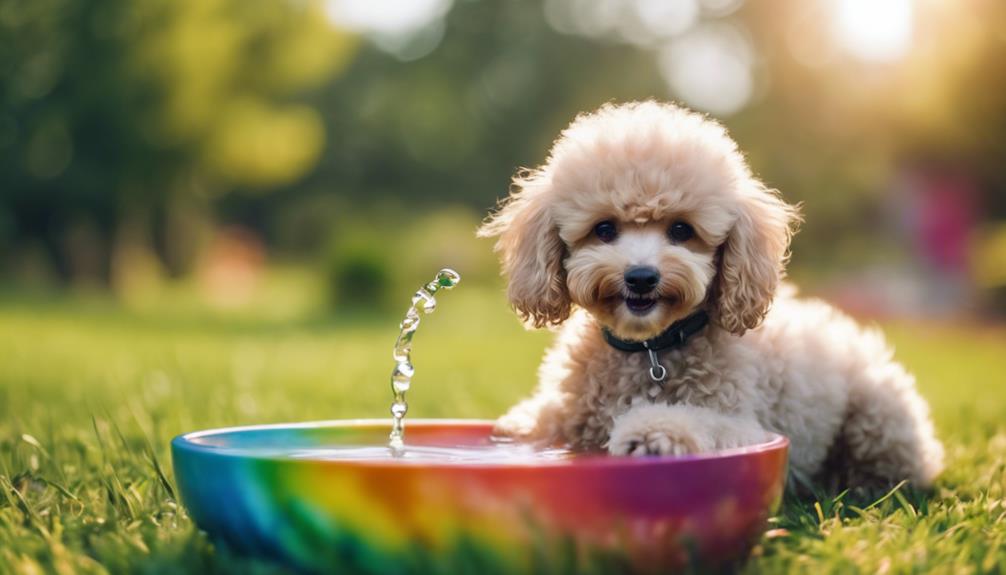
Proper hydration is essential for the optimal health and growth of Poodle puppies. Ensuring your puppy stays adequately hydrated is crucial for their overall well-being. Here are some key points to consider:
- Water Intake: Poodle puppies need sufficient water intake to support their digestion and nutrient absorption. Water plays a vital role in maintaining their bodily functions and keeping them healthy.
- Fresh Water: Always provide your Poodle puppy with fresh, clean water. Access to water at all times is essential to prevent dehydration and keep them hydrated throughout the day.
- Monitoring Hydration Levels: Keep an eye on your puppy's water consumption. Monitoring how much water they drink can help you ensure they are staying properly hydrated, which is essential for their healthy skin, coat, and joint function during their growth stages.
Dietary Considerations for Poodle Puppies
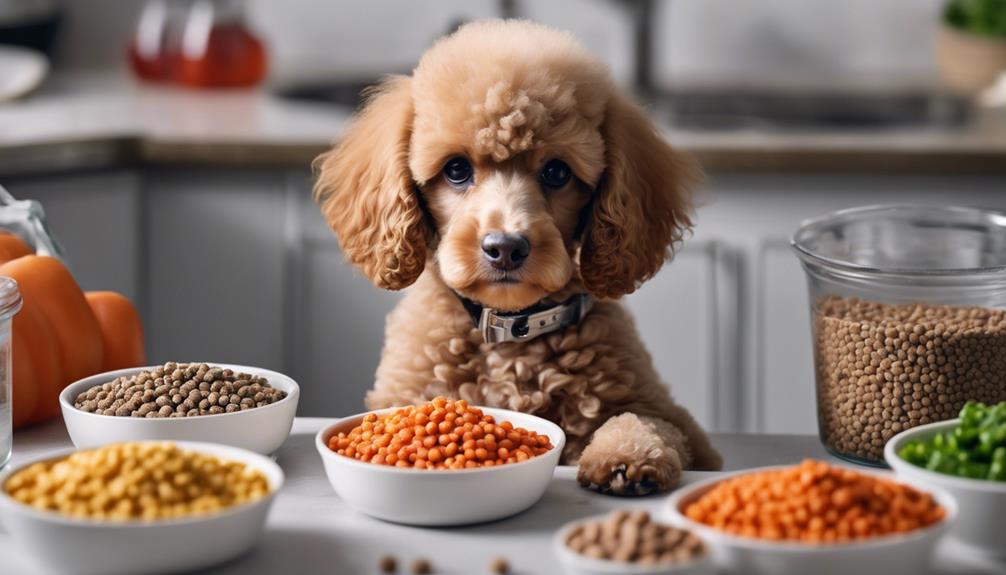
In the dietary regimen for Poodle puppies, a focus on high-quality proteins is essential for their proper growth and development. These proteins are crucial for muscle development and overall health. Including essential fats in their diet is also important as they provide energy and support healthy brain development in Poodle puppies. Ensuring a balanced nutrition plan that includes a variety of vitamins and minerals is vital for their overall well-being.
When it comes to bone development, Poodle puppies require adequate levels of calcium and phosphorus in their diet. These minerals are essential for strong bones and proper growth. Additionally, incorporating DHA, an omega-3 fatty acid, into their diet is beneficial for brain and vision development in Poodle puppies. This nutrient plays a key role in cognitive function and eyesight. By focusing on these dietary considerations, you can help support the optimal growth and development of your Poodle puppy.
Frequently Asked Questions
What Should I Feed My Poodle Puppy?
Feed your Poodle puppy high-quality puppy food options with essential proteins and fats for growth. Establish a consistent feeding schedule, monitor portion sizes, and consider grain-free diets. Include treats, manage weight, consult for supplements, and address dental health and allergies. Homemade meals can be beneficial.
What Are the Nutritional Needs of a Poodle?
To meet the nutritional needs of a Poodle, ensure protein requirements are met for puppy growth. Offer a balanced diet rich in essential vitamins and calcium for bone strength. Include nutrient-dense foods with Omega-3 fatty acids for digestive health and hydration. Vary meal frequency for optimal health.
What Do I Need for My Standard Poodle Puppy?
To provide for your Standard Poodle puppy, focus on training tips, grooming essentials, socialization techniques, exercise routines, health check-ups, toy recommendations, crate training, behavior modification, potty training, and teething solutions. These elements ensure a happy, healthy companion.
How Many Cups Should a Poodle Eat?
You should feed your Poodle based on their needs. Consider a feeding schedule with proper portion control to support growth stages. Split meals for optimal digestion. Monitor weight, offer balanced diet, and consult a vet for advice on treats, allergies, supplements, and water intake.
Conclusion
In conclusion, ensuring your Poodle puppy receives the proper nutrition is essential for their growth and development. From the importance of proteins and fats to the significance of hydration and portion control, providing a balanced diet tailored to their needs is crucial. By following dietary guidelines, transitioning gradually to adult food, and considering supplements when needed, you can help your Poodle puppy thrive and maintain optimal health for years to come.
